This article was co-authored by Anne Dunev, PhD, NP, ACN. Anne Dunev is a certified Clinical Nutritionist, Naturopathic Practitioner, and Owner of Well Body Clinic, a wellness clinic in Los Angeles, California. With over 25 years of experience, Anne specializes in herbal medicine, functional medicine, women's health, hormonal balance, and digestion. Anne holds a BS in Health Sciences from Ohio State University and a PhD in Natural Medicine. Furthermore, Anne holds a post-doctorate certification in Applied Clinical Nutrition for the Southern California University of Health Sciences. She has taught clinical nutrition, kinesiology, and soft tissue manipulation at the College of Naturopathic Medicine in London, UK. She has been a featured speaker at the International Wellness Festivals in Sun Valley, Idaho and St. Hill, UK. Anne has also been a guest on over 150 radio and television programs. She is the author of the weight-loss book called, “The Fat Fix Diet”.
There are 23 references cited in this article, which can be found at the bottom of the page.
wikiHow marks an article as reader-approved once it receives enough positive feedback. In this case, 100% of readers who voted found the article helpful, earning it our reader-approved status.
This article has been viewed 390,418 times.
Cholesterol is an essential lipid that helps your body function properly. It has many functions including helping your glands make hormones, your liver to produce bile, and your cells to maintain their structural integrity. However, too much of certain types of cholesterol exposes you to a number of health risks, namely atherosclerosis, which can lead to heart attacks. You can lower your cholesterol levels by certain lifestyle changes and if that does not work, your doctor may prescribe medications.
Steps
Lowering Cholesterol Through Diet
-
1Know what cholesterol is. Cholesterol is an essential part of a balanced diet but too high cholesterol levels can impact your health negatively and contribute to heart disease. But not all cholesterol is the same:
- Low-density lipoprotein (LDL) cholesterol, also known as the "bad" cholesterol, tends to accumulate in plaques inside the cardiac arteries, contributing to heart disease.[1]
- High-density lipoprotein (HDL) cholesterol, also known as the “good” cholesterol, helps reduce the amount of LDL cholesterol in the body and may also contribute to a decreased risk of heart disease and stroke.[2]
-
2Examine your diet. Most of the cholesterol you need is made by your body. However, food products contain additional cholesterol which contributes to increased levels in your body.[3]
- Reduce your intake of animal-source foods that are high in cholesterol, including red meats, shellfish, eggs, butter, cheese, and milk.
- In addition, you should avoid foods that contain saturated or trans fats as these increase the levels of LDL cholesterol as well.[4]
- Limit the amount of refined sugars you eat.[5]
- Build your diet around fresh produce, vegetable-sources of fat and protein and high-fiber foods.[6]
Advertisement -
3Keep your fat intake between 25 and 35% of your daily calories. Fats are an important part of a balanced diet, but you need to moderate how much you eat and what types of fats you include in your diet. Polyunsaturated and monounsaturated fats are considered to be the good, heart-healthy fats, while saturated and trans fats are considered unhealthy.
- Polyunsaturated and monounsaturated fats help lower LDL cholesterol, which is why you should eat more healthy sources of fat in order to decrease your risk of developing heart disease and stroke.[7]
- Foods high in healthy fats include tofu, fish (such as salmon, mackerel, and river trout), avocado, nuts (such as walnuts, hazelnuts, and macadamia nuts), beans (such as kidney beans, soybeans, and navy beans), and vegetable oils (such as olive, safflower, and flaxseed oil).
- Saturated fats and trans fats increase your levels of LDL cholesterol, contributing to plaque-development inside your arteries.
- Avoid foods that are fried and highly processed, and make sure that you moderate your intake of foods that are full of unhealthy fats, such as fried chicken, cookies, crackers, and full-fat dairy.
- In addition, you should limit your intake of cholesterol from food to less than 300 mg a day. If your cholesterol is high, the recommended amount is less than 200 mg per day.
-
4Use olive oil for cooking instead of butter. Butter contains saturated fats that can raise LDL cholesterol. In contrast, olive oil contains antioxidants that can lower your LDL cholesterol without changing your HDL cholesterol.[8]
- The FDA recommends about 2 tablespoons, or 23 grams, of olive oil a day to benefit from its heart-healthy benefits. Some research suggests that the cholesterol-lowering effects of olive oil are even better if you choose extra-virgin olive oil.
-
5Get at least 25 to 30 grams of fiber each day. Fiber is an essential part of a healthy diet that helps contribute to your heart health. Soluble fiber helps lower your cholesterol by binding with LDL cholesterol while it is still in your digestive system, keeping it from being absorbed in your bloodstream.[9]
- Soluble fiber can be found from a variety of sources, including whole grain oatmeal, beans, nuts, and apples.[10]
- Insoluble fiber is also an important for your diet. Although it does not help lower cholesterol like soluble fiber, it does add bulk to stool and promotes better digestive system health. Sources of insoluble fiber include wheat bran and whole grains.[11]
-
6Eat complex carbohydrates. Complex carbohydrates are rich in nutrients, such as vitamins, minerals, and fiber but they also help lower your cholesterol levels. In contrast, food high in simple sugars have been linked to elevated LDL cholesterol levels.[12]
- Good sources of complex carbohydrates include oat bran, legumes, cabbage, whole grain pasta, and corn.
- Many studies have shown a link between high consumption of sugars with increased cholesterol and plasma lipid levels. Limit your intake of sweets and baked goods.[13]
-
7Choose fish over red meat. Fish contain heart-healthy omega-3 fatty acids that do not contribute to LDL cholesterol levels. Dietary guidelines recommend having at least two servings of fish each week.[14]
- The highest levels of omega-3 fatty acid are found in mackerel, lake trout, herring, sardines, albacore tuna, and salmon.[15]
- Red meat is high in LDL cholesterol and saturated fats. When choosing beef, opt for leaner cuts (such as top and bottom round roast, top sirloin and sirloin tip side steak) or choose a white-meat protein source, such as turkey or chicken, whenever possible to help manage your cholesterol level.[16]
-
8Eat avocados and nuts. Avocados and nuts are good vegetarian sources of monounsaturated fats that help lower LDL cholesterol levels. They are also packed with other healthy nutrients, such as protein, vitamins, and minerals.[17]
- However, avocados and especially nuts are relatively high in calories and thus you should eat them in moderation. Consuming too many calories can make you overweight and being overweight puts you at higher risk for heart disease. A handful of nuts and/or one avocado a day are enough.
-
9Add whey protein to your diet. Whey protein is derived from dairy and is shown to be effective at lowering levels of LDL cholesterol in the bloodstream.[18]
- Whey protein is often offered in vanilla and chocolate flavors and can be added to a shake, oatmeal, or yogurt.
- Caution: too much protein might not be good for you. Monitor your intake and limit your protein consumption to 15-25% of total daily calories per day or 0.8-1.2 grams per kilogram of body weight. This translates to approximately 53 grams for a 140-lbs woman who does not exercise.[19]
- If you exercise, are pregnant, or breastfeeding, your protein consumption is higher. If you are unsure how much to take, consult your doctor.
-
10Eat plant sterols. Plant sterols help you manage your cholesterol level by blocking your body’s ability to absorb it, lowering LDL cholesterol levels by 6-15% without affecting the HDL cholesterol levels. Eating foods rich in plant sterols may be a good way to reduce your LDL cholesterol level and improve your heart health.[20]
- Consuming sterols in recommended quantities of 2gm per day can lead to lowering LDL to that rate.
- Sterols occur naturally in grains, fruits, legumes, vegetables, nuts, and seeds.
- Sterols are also added to many different kinds of foods, including orange juice, and yogurt.
-
11Drink green tea. A clinical study indicated that drinking green tea may help lower your cholesterol and triglyceride levels. Green tea also prevents your intestines from absorbing cholesterol and thus facilitates its excretion from your body.
- Green tea also has other health benefits and is thought to boost the immune system and decrease inflammation.[21]
- Replace soda, juices, and other drinks with ice-cold green tea flavored with lime or sugar-free sweeteners.
-
12Eat six small meals a day. A British study showed that those eating six small meals a day resulted in significantly lower cholesterol than those eating two meals a day—despite the fact that those eating the six small meals actually consumed more calories and fat.
- Break your daily calories between five or six meals. This will help keep you satisfied throughout the day and reduce unhealthy cravings.
Lowering Cholesterol Through Lifestyle Changes
-
1Exercise regularly. Physical inactivity is a major risk factor for heart disease. Regular exercise can directly impact your cholesterol by increasing the good HDL cholesterol levels. It is also has an indirect impact on your cholesterol levels by helping you manage or reduce your weight.[22]
- The exercise guidelines recommend that adults should get at least 150 minutes of moderate-activity aerobic exercise and two or more muscle-strengthening exercise sessions per week.[23] 140 minutes will help you maintain your current weight, 210 minutes will help reduce your weight.
- If you don't have time to exercise regularly, get up from your desk take a five minute walk every hour.
- Besides taking on a new exercise, you can also increase your physical activity with simple daily practices, such as taking the stairs instead of the elevator and parking your car farther away from the door.
-
2Stop smoking. It is well known that smoking has a negative impact on your lung and heart health. Besides reducing your risk of other health conditions, quitting smoking may also impact your cholesterol by raising your HDL cholesterol level.[24]
- You should also do your best to stay away from secondhand smoke.
- Get support to help you quit smoking by talking to your doctor about support groups and smoking cessation treatments, such as nicotine patches.
-
3Limit your alcohol intake.[25] Drinking moderate amounts of red wine may help raise your HDL cholesterol levels. However, drinking too much alcohol can result in dehydration and lead to chronic illnesses and addiction over time.[26]
- Limit your alcohol consumption to one drink a day if you are a healthy female, two drinks per day if you are a healthy male.[27]
-
4Lose weight. If you are carrying extra weight, then you likely have higher LDL cholesterol levels. Managing your weight is key to maintaining balanced cholesterol levels; you can improve your cholesterol levels by losing as little as 5-10% of your weight.[28]
- Evaluate your diet and make sure that you are not taking in more calories than you burn on a daily basis.
- You should also engage in regular exercise to burn off extra calories and improve your cardiovascular health. Always consult with your doctor before starting a new exercise program.
Lowering Cholesterol with Medications
-
1Ask your doctor if you should take statins. If you suffer from high cholesterol and lifestyle changes are not enough to lower the levels, your doctor may suggest you take medications. Statins help lower LDL cholesterol and may also raise your HDL cholesterol.[29]
- Statins are market under several brands including lovastatin (Altoprev, Mevacor), rosuvastatin (Crestor), atorvastatin (Lipitor), and fluvastatin (Lescol).
- Side effects of statins are typically mild and include muscle aches and changes in digestive patterns.[30]
- You should not take statins if you are pregnant.
-
2Get a prescription for selective cholesterol absorption inhibitors. Selective cholesterol absorption inhibitors (such as Zetia or ezetimibe) are relatively new drugs that work by keeping your intestines from absorbing cholesterol from food.[31]
- Side effects of selective cholesterol absorption inhibitors include headache, fatigue, and stomachache.[32]
-
3Ask your doctor about resins. Resins make your liver use up cholesterol to produce increased levels of bile, thus lowering your total cholesterol levels and LDL cholesterol.[33]
- Resins are marketed under Colestid (colestipol), Welchol (colesevelam) and Questran (cholestyramine sucrose).
- Side effects of resins are generally mild and typically include gas, bloating, nausea, stomachache, and heartburn.[34]
-
4Ask your doctor about lipid-lowering medications. Lipid-lowering medications help lower triglycerides and LDL cholesterol by inhibiting your body from processing them. Fibrates and niacins are two types of lipid-lowering medications.[35]
- Side effects of lipid-lowering medications include gas, stomachache, and nausea.[36]
-
5Consider PCSK9 inhibitors. If your cholesterol level does not seem to respond to any of these treatment methods, you may want to be evaluated for a genetic condition called familial hypercholesterolemia, and may be a candidate for PCSK9 inhibitors.
Warnings
- It is often difficult for people to understand the urgency of treating their cholesterol because heart disease is a slow and silent killer. There aren't any outward symptoms until it is too late!⧼thumbs_response⧽
- Take care of high cholesterol as soon as possible. Not doing so could put you at greater risk of suffering from a heart attack, blood clots, or other heart problems.⧼thumbs_response⧽
References
- ↑ http://www.heart.org/HEARTORG/Conditions/Cholesterol/AboutCholesterol/Good-vs-Bad-Cholesterol_UCM_305561_Article.jsp
- ↑ http://www.heart.org/HEARTORG/Conditions/Cholesterol/AboutCholesterol/Good-vs-Bad-Cholesterol_UCM_305561_Article.jsp
- ↑ http://www.americanheart.org/presenter.jhtml?identifier=514
- ↑ http://www.heart.org/HEARTORG/Conditions/Cholesterol/AboutCholesterol/Good-vs-Bad-Cholesterol_UCM_305561_Article.jsp
- ↑ Anne Dunev, PhD, NP, ACN. Certified Nutritionist & Naturopathic Practitioner. Expert Interview. 2 September 2020.
- ↑ Anne Dunev, PhD, NP, ACN. Certified Nutritionist & Naturopathic Practitioner. Expert Interview. 2 September 2020.
- ↑ http://www.mayoclinic.org/healthy-lifestyle/nutrition-and-healthy-eating/in-depth/fat/art-20045550
- ↑ http://www.mayoclinic.com/health/cholesterol/CL00002
- ↑ https://www.nlm.nih.gov/medlineplus/ency/article/002136.htm
- ↑ https://www.nlm.nih.gov/medlineplus/ency/article/002136.htm
- ↑ https://www.nlm.nih.gov/medlineplus/ency/article/002136.htm
- ↑ http://circ.ahajournals.org/content/106/4/523.full
- ↑ http://circ.ahajournals.org/content/106/4/523.full
- ↑ http://www.mayoclinic.org/diseases-conditions/high-blood-cholesterol/in-depth/reduce-cholesterol/art-20045935
- ↑ http://www.heart.org/HEARTORG/GettingHealthy/NutritionCenter/HealthyDietGoals/Fish-and-Omega-3-Fatty-Acids_UCM_303248_Article.jsp
- ↑ http://www.mayoclinic.org/healthy-lifestyle/nutrition-and-healthy-eating/in-depth/cuts-of-beef/art-20043833
- ↑ http://www.mayoclinic.org/diseases-conditions/high-blood-cholesterol/in-depth/cholesterol/art-20045192
- ↑ http://www.mayoclinic.org/diseases-conditions/high-blood-cholesterol/in-depth/cholesterol/art-20045192?pg=2
- ↑ http://www.health.harvard.edu/blog/how-much-protein-do-you-need-every-day-201506188096
- ↑ https://my.clevelandclinic.org/health/diseases_conditions/hic_Cholesterol/hic_Plant_Sterols_and_Stanols
- ↑ https://www.perio.org/consumer/green-tea
- ↑ http://www.mayoclinic.org/diseases-conditions/high-blood-cholesterol/in-depth/reduce-cholesterol/art-20045935
- ↑ http://www.cdc.gov/physicalactivity/basics/adults/index.htm
- ↑ http://www.mayoclinic.org/diseases-conditions/high-blood-cholesterol/in-depth/reduce-cholesterol/art-20045935
- ↑ Anne Dunev, PhD, NP, ACN. Certified Nutritionist & Naturopathic Practitioner. Expert Interview. 2 September 2020.
- ↑ http://circ.ahajournals.org/content/102/19/2347.full
- ↑ http://www.mayoclinic.org/diseases-conditions/high-blood-cholesterol/in-depth/reduce-cholesterol/art-20045935?pg=2
- ↑ http://www.mayoclinic.org/diseases-conditions/high-blood-cholesterol/in-depth/reduce-cholesterol/art-20045935?pg=2
- ↑ http://www.heart.org/HEARTORG/Conditions/Cholesterol/PreventionTreatmentofHighCholesterol/Drug-Therapy-for-Cholesterol_UCM_305632_Article.jsp
- ↑ http://www.mayoclinic.org/diseases-conditions/high-blood-cholesterol/in-depth/statins/art-20045772?pg=2
- ↑ http://www.heart.org/HEARTORG/Conditions/Cholesterol/PreventionTreatmentofHighCholesterol/Drug-Therapy-for-Cholesterol_UCM_305632_Article.jsp
- ↑ http://www.mayoclinic.org/diseases-conditions/high-blood-cholesterol/in-depth/cholesterol-medications/art-20050958
- ↑ http://www.heart.org/HEARTORG/Conditions/Cholesterol/PreventionTreatmentofHighCholesterol/Drug-Therapy-for-Cholesterol_UCM_305632_Article.jsp
- ↑ http://www.mayoclinic.org/diseases-conditions/high-blood-cholesterol/in-depth/cholesterol-medications/art-20050958
- ↑ http://www.mayoclinic.org/diseases-conditions/high-blood-cholesterol/in-depth/cholesterol-medications/art-20050958
- ↑ http://www.mayoclinic.org/diseases-conditions/high-blood-cholesterol/in-depth/cholesterol-medications/art-20050958
- ↑ http://www.mondaycampaigns.org/healthy-monday/
About This Article
To lower your cholesterol, cut down on the foods you eat with high levels of cholesterol, like red meats, eggs, and cheese. You should also try to obtain your fat from healthy sources, such as salmon, avocados, walnuts, or beans. Additionally, avoid transfats, which are often found in processed foods, because they significantly increase cholesterol. If you currently cook with butter, replace it with olive oil, which has much lower cholesterol levels. Once you’ve made these dietary changes, aim to perform moderate exercise several times a week, such as walking or running, since physical activity helps reduce cholesterol levels. For tips from our Medical co-author on how to reduce your cholesterol levels with medication, read on!
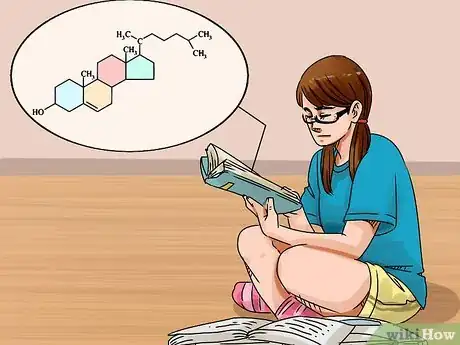
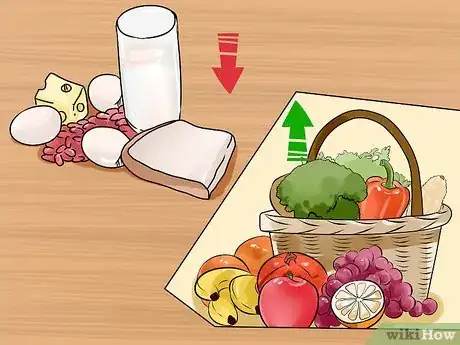

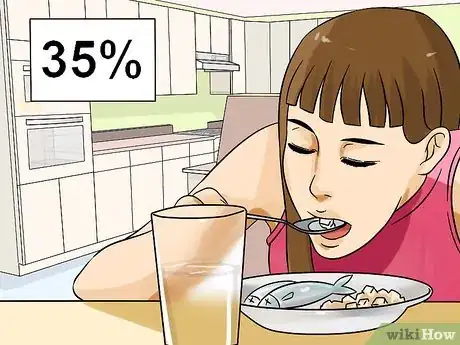
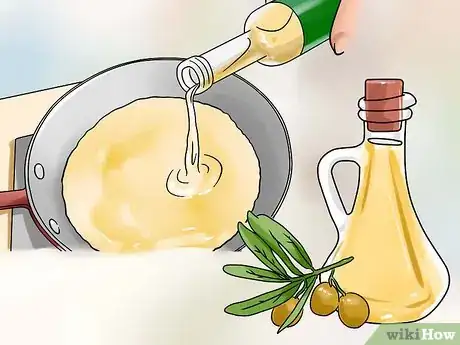
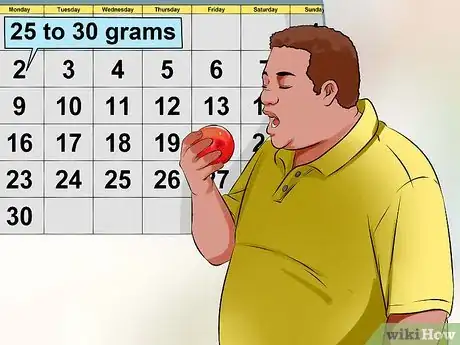
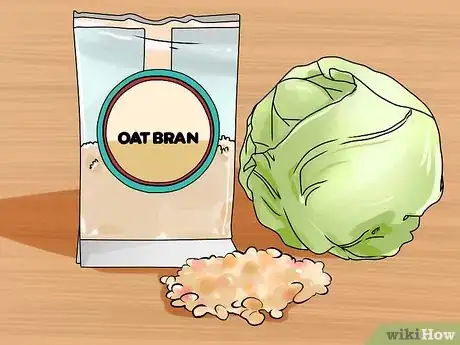
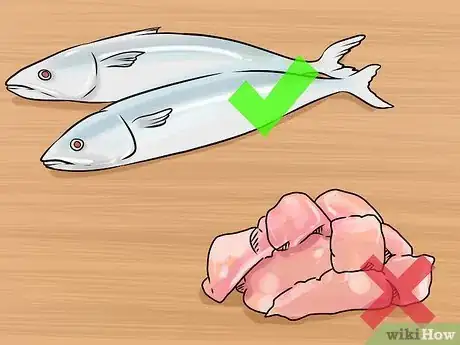
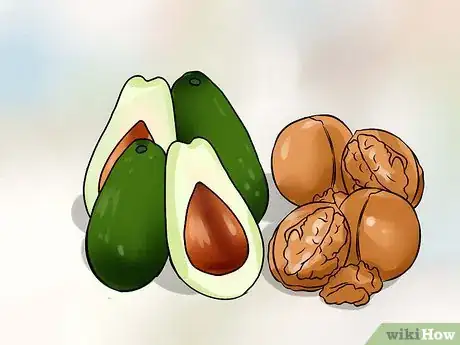
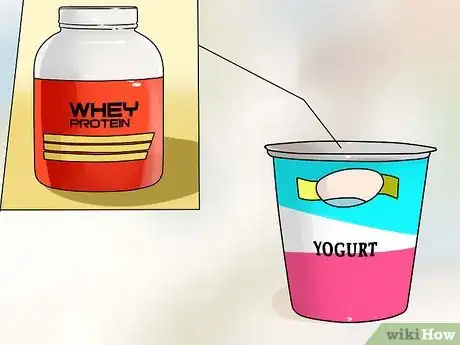
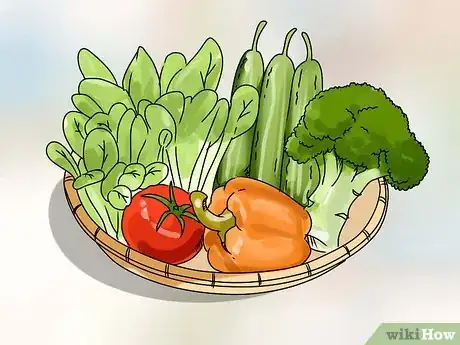

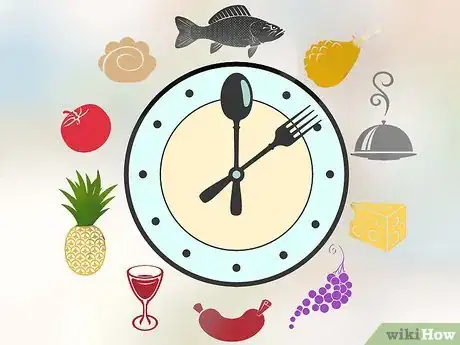

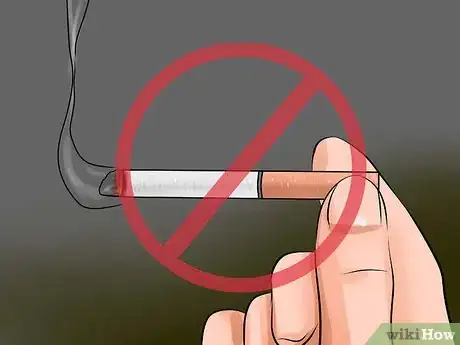
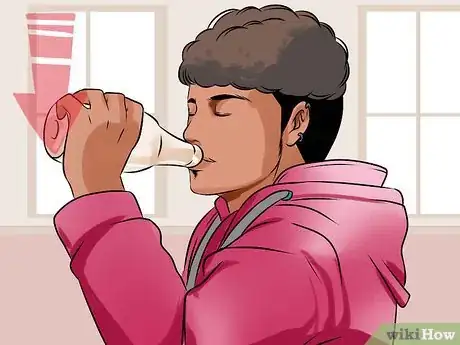
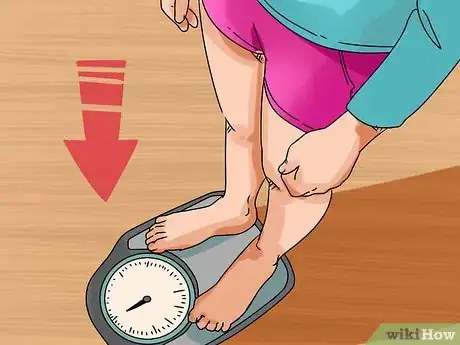

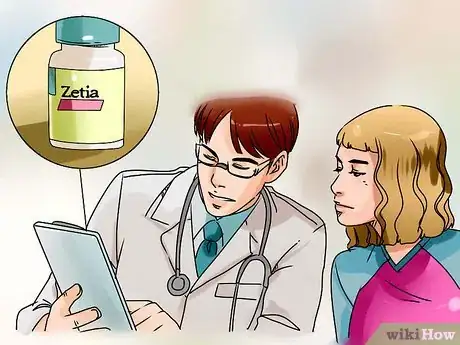
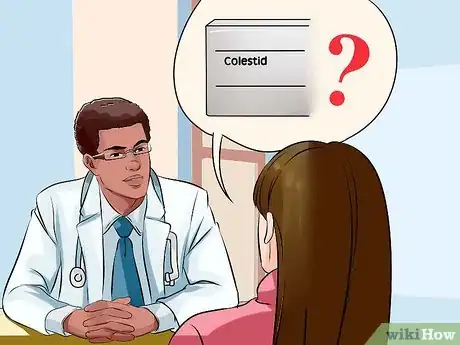
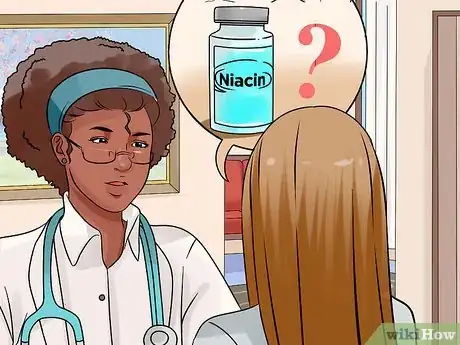
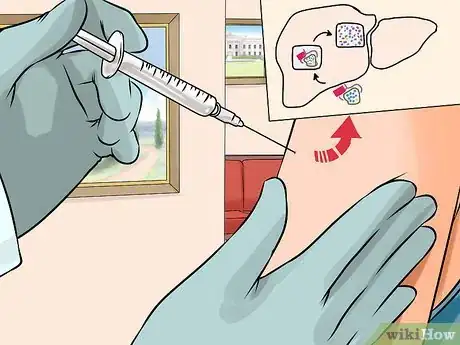
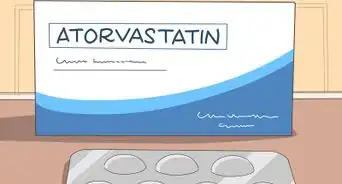



-Step-14-Version-3.webp)






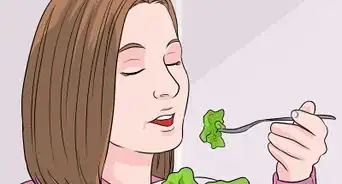










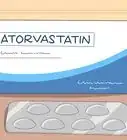





































Medical Disclaimer
The content of this article is not intended to be a substitute for professional medical advice, examination, diagnosis, or treatment. You should always contact your doctor or other qualified healthcare professional before starting, changing, or stopping any kind of health treatment.
Read More...